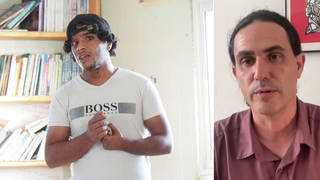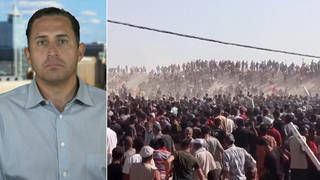
Guests
- Josh Eidelsona staff reporter at Salon.com. His latest article is called “Tens of Thousands Protest, Over 100 Arrested in Black Friday Challenge to Wal-Mart.”
At least 111 people were arrested on Black Friday in a series of protests and acts of civil disobedience targeting Wal-Mart and other big-box retailers. In St. Paul, Minnesota, 26 protesters were arrested when they blocked traffic while demanding better wages for janitors and retail employees. In Illinois, 10 people were issued citations at a protest near a Wal-Mart in Chicago. Video posted online showed nine people being arrested at a protest outside a Wal-Mart store in Alexandria, Virginia. At Wal-Mart protests in California, 15 people were arrested in Roseville, 10 arrested in Ontario, and five arrested in San Leandro. Organizers said actions took place at 1,500 Wal-Mart locations across the country, up from about 400 locations last year. Meanwhile, fast-food workers have announced plans to hold a one-day strike in 100 cities on Thursday as part of a campaign to win a $15-an-hour wage. We discuss the labor protests with Josh Eidelson, staff reporter at Salon.com.
Transcript
AMY GOODMAN: At least 111 people were arrested Black Friday in a series of protests and acts of civil disobedience targeting Wal-Mart and other big-box retailers. In St. Paul, Minnesota, 26 protesters were arrested when they blocked traffic while demanding better wages for janitors and retail employees; in Illinois, 10 people issued citations at a protest near a Wal-Mart in Chicago. Video posted online showed nine people being arrested at a protest outside a Wal-Mart store in Alexandria, Virginia.
PROTESTER: Nine community leaders, labor leaders, workers were just arrested as part of a civil disobedience to bring attention to the fact that Wal-Mart is not treating its workers right, that it’s not respecting it, that it’s not letting workers exist with dignity. And so, we wanted to make sure that they knew and that the workers know that there’s a large community behind them that supports them and that’s going to stick by them until we get right and respectful treatment, dignified work, good salaries.
AMY GOODMAN: Protests were also held across California. Fifteen people were arrested outside a Wal-Mart in Roseville, another 10 arrested in Ontario, California, five more people arrested outside a Wal-Mart in San Leandro. Organizers said actions took place at 1,500 Wal-Mart locations across the country, up from 400 last year. Meanwhile, fast-food workers have announced plans to hold a one-day strike in a hundred cities Thursday as part of a campaign to win a $15-an-hour wage.
To talk more about these labor protests, we’re joined by Josh Eidelson, staff reporter at Salon.com. His latest article, “Tens of Thousands Protest, Over 100 Arrested in Black Friday Challenge to Wal-Mart.”
So, how significant were these protests?
JOSH EIDELSON: Well, by some measures, these were the largest protests we’ve seen against Wal-Mart, in that you had 1,500 stores involved; you had somewhat over a hundred people arrested; you had, certainly, once again, Wal-Mart put in an uncomfortable spotlight on what should be the happiest day of the year for the retailer. What isn’t clear is whether there were any more Wal-Mart employees involved than one year ago. And organizers made a strategic shift from last year focusing on strikes to this year putting in the spotlight civil disobedience. Many of the people in those civil disobediences were not Wal-Mart employees. And so, the fact that it’s not clear we saw any more than the 400-some workers who went on strike in 2012 involved in protest in 2013, I think, speaks to the challenges of organizing at Wal-Mart, particularly in the aftermath of the firing of 23 strikers by Wal-Mart in the period coming after a trip to Arkansas this summer.
AMY GOODMAN: And talk about the NLRB decision that’s very significant for them.
JOSH EIDELSON: So, the National Labor Relations Board has announced that it’s ready to issue a complaint, roughly the equivalent of an indictment, against Wal-Mart for a number of allegations involving the company’s efforts to restrain people from going on strike. This includes everything from comments made to CNN by David Tovar, a Wal-Mart spokesperson who has since been promoted to vice president, who said that, “Depending on the circumstances, there could be consequences if you don’t come to work,” to firings, other forms of retaliation, alleged retaliation, various kinds of discipline against workers who stood up. And these allegations have been made throughout the campaign. The alleged retaliation intensified earlier this year after this several-day trip to Arkansas, this protest at the shareholder convention. And in conversations with workers, those actions have had a real effect. And so, there is hope expressed, both by employees and by activists, that the labor board moving forward with these allegations will embolden workers to stand up to this alleged retaliation, but the labor board does not have a very successful history of averting or avenging actions by companies that try to squash workers organizing.
AMY GOODMAN: And talk about OUR Walmart, the group affiliated with United Food and Commercial Workers.
JOSH EIDELSON: So, this is a group that has very close ties to the UFCW. It is not a union. It is not seeking collective bargaining. But it’s a group of workers who are demanding changes to scheduling, schedules that they say are erratic and insufficient; changes to wages, including a demand for a $25,000-a-year wage floor for full-time work; and an end to that retaliation, the right to organize and speak up, which is recognized under U.S. law not just for people who want a union, but for workers who want to engage in action collectively to change their conditions.
AMY GOODMAN: The amount of public subsidy for Wal-Mart workers because they make so little, how much does the public pay?
JOSH EIDELSON: So, depending on what one counts, there was a study that was released by congressional Democrats looking at Wisconsin that estimated that Wal-Mart workers at one store used nearly a million dollars in public assistance. And this speaks to—while there are questions about what kind of language makes sense to use—I think sometimes the language that people use to talk about this really reinforces some of the anti-welfare sentiment that people have—it is clear that the fact that our largest employer, which is owned by our wealthiest family, is a company whose employees, in tremendous numbers, depend on our very stingy poverty programs in the United States, says a lot about the state of the U.S. economy and work.
AMY GOODMAN: And it wasn’t just protests at Wal-Mart stores.
JOSH EIDELSON: In Minnesota, there were also subcontracted janitors involved who clean Target buildings. These are workers who have gone on strike previously, who are facing, as Wal-Mart warehouse workers do, what I call the “Who’s the Boss” problem, where they’re not legally employed by this giant corporation, but they would argue they are subject to the business model of that company, and they’re trying to put that company in the spotlight as a way of forcing some pressure to raise those conditions.
AMY GOODMAN: Talk about what’s going to happen on Thursday and how these actions, if they are, are related.
JOSH EIDELSON: So, The New York Times’ Steven Greenhouse reported that the fast-food campaign, an effort that, as I reported first at Salon, came out last year with a strike in one city in New York, which we’ve seen escalate since then, Greenhouse reported, is going to involve strikes in a hundred cities on Thursday and protests in many more. So this is a serious escalation by a campaign that is significantly backed by the Service Employees International Union, that also represents an effort by labor, in a time when organized labor is largely on defense, to tackle one of our largest and increasingly representative industries. The nature of fast-food work increasingly is the nature of work in the United States—precarious, surveilled, involving emotional labor, involving a lack of a consistent schedule, and poverty wages. And so, these workers, by going on strike not against one company, but against all the big companies in the industry, and beginning in one city and now escalating reportedly to a hundred cities, are trying to squeeze that industry. It remains to be seen whether the end result there, whether the best-case scenario for them, happens through some kind of national deal with major corporations to pave the way for unionization at the franchisees or whether the most direct effect is seen through legislative change. But workers have been clear from the beginning that their demand is $15 an hour and the right to unionize.
AMY GOODMAN: Whole Food workers, they’re getting involved. In New York, in some of the stores on Thanksgiving, they were open ’til 4:00.
JOSH EIDELSON: So, I reported on the case of Whole Foods workers in Chicago, who went on strike demanding the right to be off on Thanksgiving. Their argument was, let people do the shopping up until Thanksgiving, and then on Thanksgiving, this holiday that we’ve made possible for people, we should get to be home and enjoy it. And those workers at Whole Foods went out on strike in Chicago. This is a group that’s tied to the same folks in the fast-food movement in Chicago, which also includes retail and Whole Foods, and they got what they wanted. Whole Foods claimed to me and to them that that had been their policy all along, that no one has to work on Thanksgiving if they don’t want to. But none of the Whole Foods workers I talked to in Chicago or elsewhere in the country said that that was how the policy had been explained to them. And so, a rally planned by those workers for that Wednesday turned into something of a victory rally when the company said, “Yes, anybody can take the day off on Thanksgiving if they want to.”
AMY GOODMAN: And how does this movement tie in, for example, to the $15-an-hour victory that was won at SeaTac Airport in Seattle?
JOSH EIDELSON: So, folks who are involved out in Washington state have attributed the political momentum behind that $15 win, that narrow but quite significant in terms of where we go nationally potentially win, attributed it in part to the call for $15 being made by those fast-food workers around the country.
AMY GOODMAN: Well, Josh, thanks so much for updating us. Josh Eidelson is staff reporter at Salon.com. We’ll link to his piece, “Tens of Thousands Protest, Over 100 Arrested in Black Friday Challenge to Wal-Mart.”













Media Options